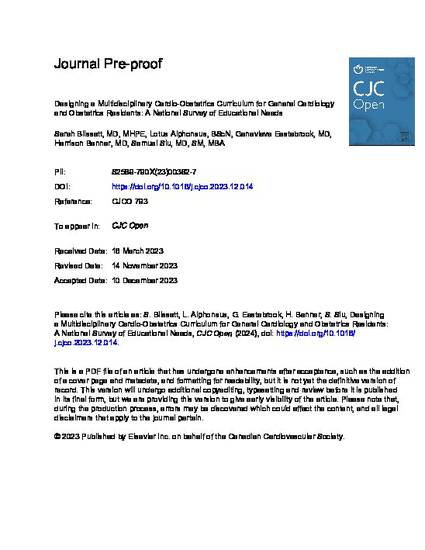
Article
Designing a Multidisciplinary Cardio-Obstetrics Curriculum for General Cardiology and Obstetrics Residents: A National Survey of Educational Needs
CJC Open
(2024)
Abstract
Background: The increasing and potentially preventable cardiac events in pregnant patients has led to calls to enhance multidisciplinary Cardio-Obstetrics education. In order to design a multidisciplinary Cardio-Obstetrics curriculum for General Cardiology and Obstetrics and Gynecology (OBGYN) residents, we need to define educational needs from the perspectives of both Cardiology and OBGYN residents. Our study characterizes the educational needs of Canadian Cardiology and OBGYN residents. Methods: Canadian Cardiology and OBGYN residents were surveyed on clinical exposures, perceived needs for topics, unperceived needs for topics (multiple choice questions) and preferences for educational formats. High priorities were defined as ≥50% of responses indicating a perceived need or ≥50% indicating an unperceived need. Results: 154 residents participated (Cardiology n=44, OBGYN n=110). Residents reported insufficient clinical exposure to nearly all cardiac disorders, with 33% of exposures occurring in multidisciplinary contexts. All topics aside from gestational hypertension were rated as high priority on perceived needs by both specialties. High priority unperceived needs were congenital heart disease (both specialties), pre-existing acquired heart disease (both specialties), medication safety (OBGYN), peripartum management (OBGYN), and pregnancy related heart disease (OBGYN). Cardiology and OBGYN residents shared preferences for in-person simulation, virtual simulation, and online modules. Conclusions: Residents in both specialties reported low clinical exposure to most cardiac disorders during pregnancy, identified high priority perceived needs in multiple topics, and shared two high priority unperceived needs. OBGYN residents identified 3 additional high priority unperceived needs. These data can inform design of multidisciplinary Cardio-Obstetrics curricula for General Cardiology and OBGYN residents.
Disciplines
Publication Date
January, 2024
Citation Information
Sarah Blissett, Lotus Alphonsus, Genevieve Eastabrook, Harrison Banner, et al.. "Designing a Multidisciplinary Cardio-Obstetrics Curriculum for General Cardiology and Obstetrics Residents: A National Survey of Educational Needs" CJC Open (2024) Available at: http://works.bepress.com/harrison-banner/8/
